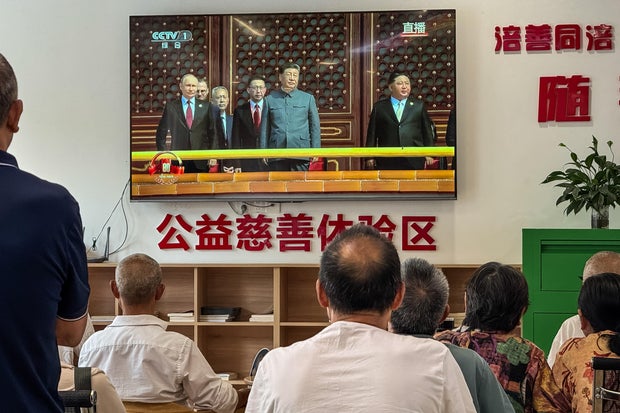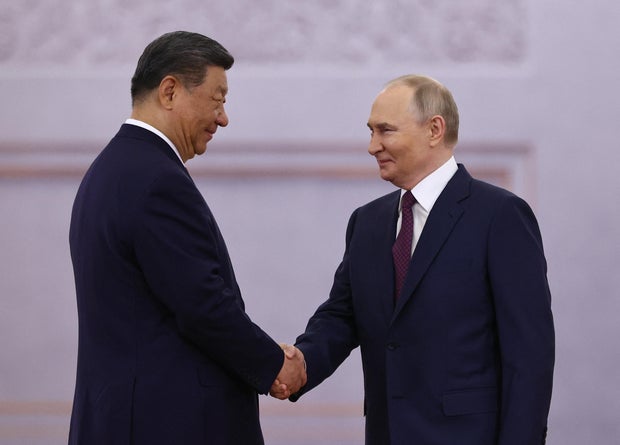China’s President Xi Jinping and his visiting Russian counterpart Vladimir Putin discussed life-prolonging organ transplants and immortality as they chatted before a massive military parade in Beijing on Wednesday, in comments picked up by state media microphones.
Historic images showed Xi shaking hands and speaking with Putin and North Korean leader Kim Jong Un as they walked down a red carpet by Tiananmen Square, in scenes viewed as a challenge to President Trump and the U.S.-led global order that has prevailed for more than a century.
“These days… 70 years old,” Xi mused in Mandarin as he walked beside Putin and Kim, according to video aired by Chinese state broadcaster CCTV. Xi’s translator conveyed the remarks to Putin, who is then heard in Russian quoting a line from a Tang dynasty poem: “In the past, it used to be rare for someone to be older than 70 and these days they say that at 70 one’s still a child.”
Cheng Xin/Getty
Putin then turned toward Xi, speaking while gesturing with his hands, though his words are inaudible on the CCTV feed. The same Chinese translator then relays Putin’s remarks to Xi.
“With the… development of biotechnology, human organs can be continuously transplanted, people could get younger as they grow older, and may even become immortal,” Putin said, according to the translator.
Xi then spoke again in Mandarin as the camera cut away: “Predictions are, in this century, it may be… possible to live to 150 years old.”
Putin confirmed the exchange during a news conference later Wednesday.
“Ah, I think it was when we were going to the parade that the chairman spoke about this,” he told reporters, referring to Xi.
“Modern means — both health improvement and medical means, and then even all kinds of surgical ones related to organ replacement — allow humanity to hope that active life will continue not as it does today,” Putin added.
China and Russia’s “no limits partnership”
Xi and Putin, along with Kim and Iran’s Supreme Leader Ayatollah Ali Khamenei, have been dubbed an “Axis of Upheaval” by some Western analysts, and Xi’s decision to bring together the leaders of some of the most heavily sanctioned nations in the world this week was clearly calculated.
The parade was the first time Kim had ever appeared together with both Xi and Putin — providing him a first multilateral diplomatic event.
Xi and Putin have made their ambition to shake up the global status quo clear for several years.
“We, together with you and with our sympathizers, will move towards a multipolar, just, democratic world order,” Russia’s longtime Foreign Minister Sergey Lavrov said in 2022, ahead of a meeting with his Chinese counterpart.
EVGENIA NOVOZHENINA/POOL/AFP via Getty Images
China and Russia have declared a “no limits partnership,” and neither Xi nor Putin, who are both 72, has ever expressed any intention of stepping down from their respective roles at the helm of their nations.
While Xi’s predecessors Jiang Zemin and Hu Jintao relinquished power after 10 years in office, he abolished term limits in 2018 and, in 2023, was handed a third term as Chinese president.
Putin was elected to a record fifth six-year term just last year in Russia. Critics dismissed the vote as a patently undemocratic farse, as virtually all of Putin’s serious political opponents were barred from running, and many of them were jailed.
Putin has twice used his leverage as Russia’s autocratic leader to amend the constitution so that he can theoretically stay in power until he’s in his mid-80s. He already is the longest-serving Kremlin leader since Soviet dictator Josef Stalin.
China, meanwhile, has historically had one of the lowest rates of organ donation in the world, with a severe shortage of organ donors and a long-standing black-market organ trade. In 2016, about four years into Xi’s tenure as leader, surgeons from the World Health Organization gathered in Beijing to try to allay skepticism about whether Chinese hospitals had, as claimed, stopped performing transplants with the organs of executed prisoners.





